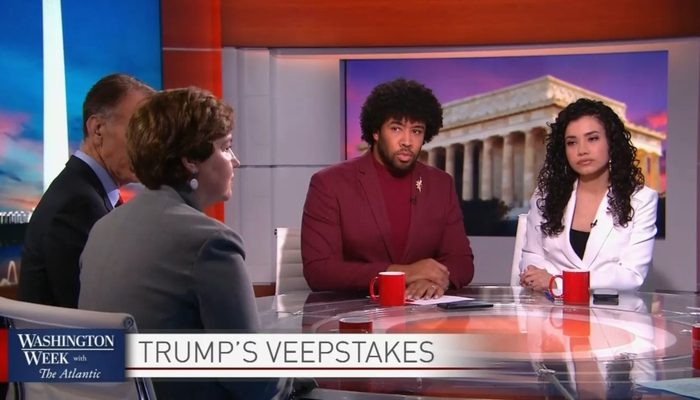Friday’s Washington Week on The Atlantic took a turn for the dramatic, as a panel of high-profile journalists began worrying over former President Trump’s enduring popularity, despite looming legal challenges. Clearly disturbing for some, the robustness of Trump’s appeal seems to show a media-class out of step with the sentiments of everyday Americans.
The discussion, captained by Jeffrey Goldberg, featured a lineup of participants from mainstream outlets like PBS NewsHour, Politico, The New Yorker, and National Public Radio. They primarily targeted Republicans in Congress with accusations of theatricality and bending to Trump’s influence, but seemed to gloss over similar patterns on the Democratic side.
Susan Glasser of The New Yorker criticized the GOP for its allegiance to the former president, drawing attention to the group of Congressional Republicans who travelled to New York to back Trump. Glasser suggested that the GOP had devolved into a Trump-centric “cult of personality”, referencing GOP members’ style choices as evidence. She painted a picture of the possible consequences of Republicans continuing to support Trump, despite his ongoing legal battles.
Glancing over any past missteps on the Democrat’s side, it’s hard to ignore Bill Clinton’s $850,000 settlement payment in a sexual harassment lawsuit. Even after such an incident, Clinton continues to enjoy a respected status within the Democratic party.
Discussing showmanship, it’s worth reminding Glasser about the iconic image of Democratic leaders donned in kente cloth, kneeling in solidarity during the George Floyd protests. A gesture some of the media labeled as a disturbing “stunt”.
Eugene Daniels of Politico seemed disturbed by the public’s lack of fear towards Trump. He highlighted a tweet by Congressman Matt Gaetz expressing support for Trump, even echoing Trump’s infamous debate night phrase: “Stand back and stand by.” There was palpable unease among the panelists over the manner in which the Republican Party has rallied around Trump, with Daniels believeing it signaled an unsettling shift within the party.
The conversation then pivoted towards the upcoming trial of Hunter Biden. The major concern here seemed to be how this trial would affect the emotional wellbeing of President Joe Biden, rather than the critical question of the president’s own potential involvement in his son’s questionable financial dealings.
In a disconcerting twist, the focus was shifted away from legality, to a more personal level. Inskeep suggested that President Biden would “take it personally because he takes this personally.” The sentiment was echoed by Goldberg who added that “He’s a father and it’s gonna affect him.” This biased narrative speaks volumes about the selective perspectives these journalists choose to convey.
In conclusion, it appears that a significant part of the traditional media continues to grapple with Trump’s undimmed popularity, seemingly undercutting conservative members of Congress while glossing over mirrored issues on their preferred side of the political spectrum. It would appear as if objectivity is lost in their panic, illustrating a telling disconnect from the sentiments of the voters they purport to understand.



